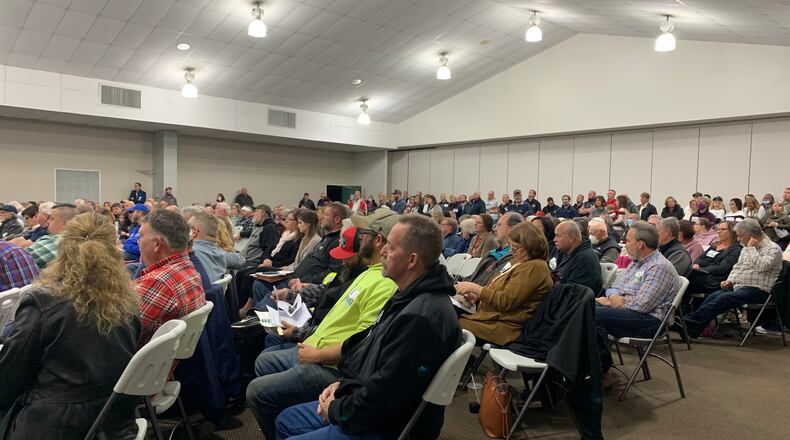“This project has torn our tight-knit community apart,” said Cedarville Twp resident Rick Hudgell. “It’s pitted friend against friend, neighbors against neighbors, and even family against family.”
The proposed facility, named Kingwood Solar, would place solar panels on 1,500 acres of land between Cedarville and Yellow Springs. The owner, Vesper Energy, acquired long-term leases from at least 17 area landowners to build the solar farm on their properties.
Individuals opposing the project Monday night cited the utility’s use of prime farmland, and the proximity of 1,500 acres of solar panels to rural homes. Many individuals testified that Texas-based Vesper Energy had approached them in bad faith, citing interactions with Vesper employees, and a Good Neighbor Agreement offering thousands of dollars in return for ceasing their opposition to the project.
“It’s about money. They don’t care about green technology,” said Zach Morgan, who owns 80 acres in the project area. “They just care about lining their pockets. The handful of people that are profiting from this are not from here.”
However, many farmers who leased their land to Kingwood view the project as an opportunity to save their land for future generations, and prevent it from being scooped up by housing developers. Additionally, the rising costs of agriculture for small, independent farmers and diminishing returns on investment were given as reasons to diversify their income.
Jeffrey Grafton, who has leased 29 acres of his farm to the project, says he leased his land as a way to preserve it for his children, and views it as functioning similar to a land trust.
“All my children are gainfully employed in non-agriculture professions. Upon their inheritance of the farm, given the minimal income, I anticipate my farm will be sold, most likely to a residential developer,” he said. “This is not what I want to happen to my property that I worked so hard for.”
“Solar is an alternative,” Grafton added. “It provides a reasonable amount of revenue, and will provide a way that my children can both retain the farm and receive a financial benefit from all the work I put into acquiring it.”
Kingwood Solar would be a 175-megawatt solar array operation designed to generate approximately 360,000 megawatt-hours of electricity per year. Kingwood seeks to build the facility in Greene County because of its ideal sunlight conditions for solar development, land availability, and proximity to the electric grid.
The testimony provided Monday night will become a part of the official case record that the Ohio Power Siting Board must review when issuing its decision in the proceeding, OPSB spokesman Matt Schilling said.
Greene County Commissioners opposed the project, and OPSB’s own technical staff recommended that the board deny Kingwood Solar’s application, or make them agree to 37 conditions.
An adjudicatory hearing is scheduled to begin on Dec. 13.
Many more who were scheduled to speak Monday provided written testimony as the hearing approached midnight. Those statements will appear under public comments on the case docket as soon as they are filed, Schilling said.
About the Author

